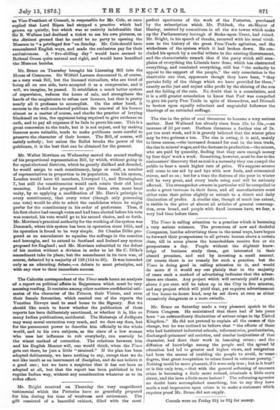The rise in the price of coal threatens to become
a very serious matter. Best Walhend has already risen from 23s. to 35s.,ŌĆöan increase of 50 per cent. Durham threatens a further rise of 2s. per ton next week, and it is gravely believed that the winter price may be two guineas a ton. The rise is owing, it is said, mainly to three causes,ŌĆöthe increased demand for coal in the iron trade, the rise in miners' wages, and the decrease in productionŌĆöthe miners, who are paid by quantity, finding that they earn enough money by four days' work a week. Something, however, must be due to the coalmasters' discovery that as coal is a necessity they can compel the public to bear a much higher rate of price. We suppose science will come to our aid by and bye with new fuels, and economical stoves, and so on ; but for a time the distress of the poor in winter will be very great, and every trade using coal will be seriously affected. The steampacket-owners in particular will be compelled to make a great increase in their fares, and all manufacturers must either raise their prices slightly or submit to a direct and daily diminution of profits. A similar rise, though of much less extent, is visible in the price of almost all articles of general consump- tion, even bread, and people with fixed incomes have, we fear, a very bad time before them.


































 Previous page
Previous page